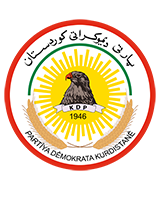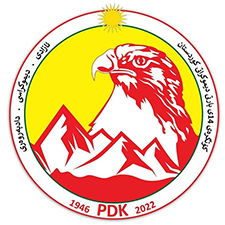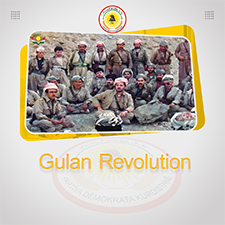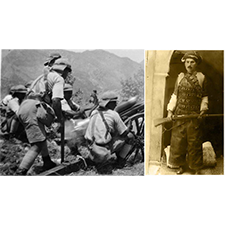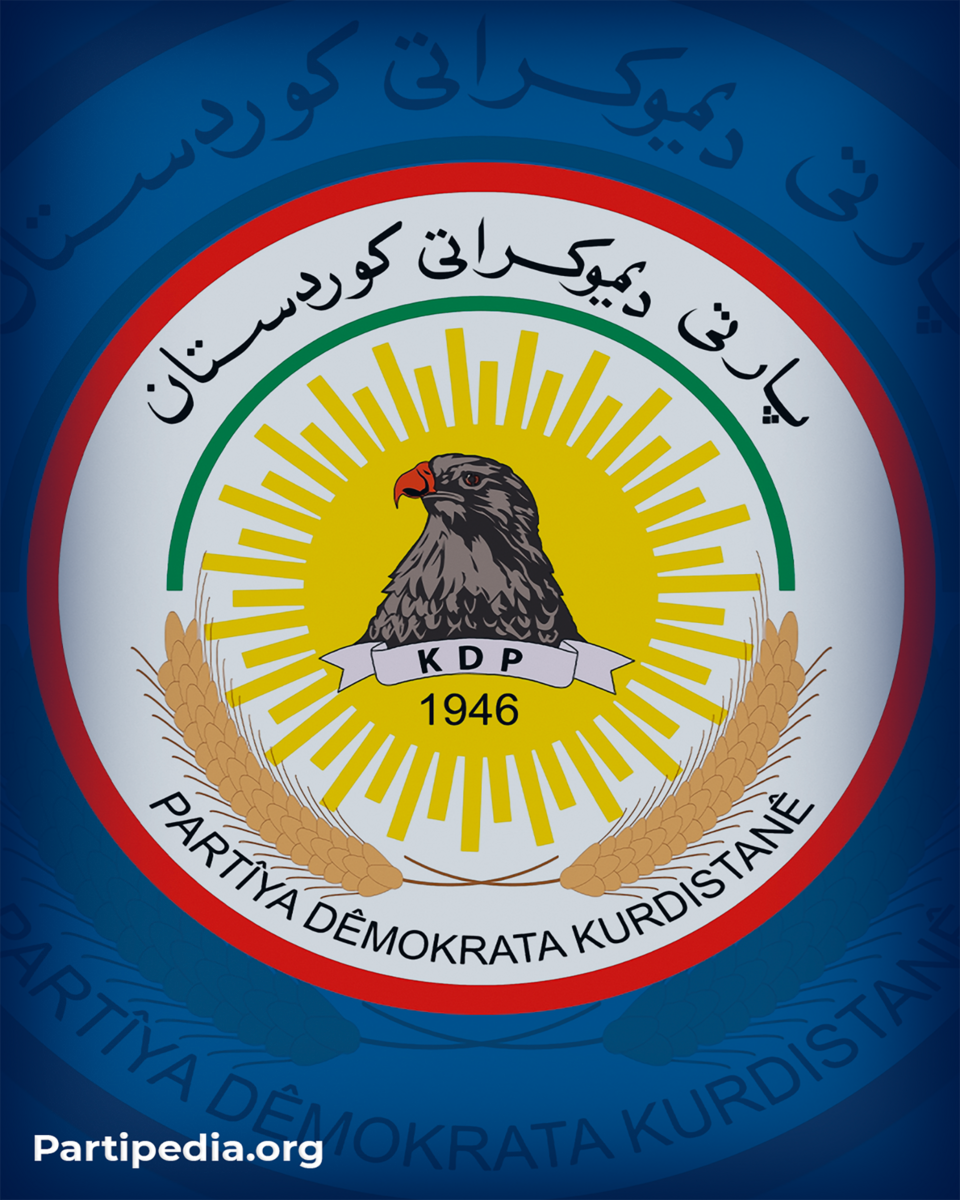The condition of the Party before the Congress
In 1955, Jalal Talabani, as the representative of the Kurdistan Democratic Youth Union with the Iraqi Democratic Youth Organization of the Communist Party of Iraq, participated in the International Youth Congress. In Warsaw, the capital of Poland, he later went to Beijing, the capital of China, to participate in a youth festival as a representative of the Kurdistan Democratic Youth Union. Jalal Talabani, in his way home in the Soviet Union, was able to get advice regarding party from President Mustafa Barzani twice via phone in Moscow, and Barzani had previously been informed by Jalal Talabani in a letter about the Party's problems and situation. In this phone call President Barzani demanded that the dispute between Hamza Abdullah and Ibrahim Ahmad to come to an end and to reunite.
On the request of President Mustafa Barzani, several meetings between Hamza Abdullah and Ibrahim Ahmad to unify and resolve the conflicts were organized. Finally, a statement issued by the "Senior Front of the Kurdish Democratic Party", which was supervised by Hamza Abdullah, was published for the purpose of self-rescinding and returning to the ranks of the Party.
After Hamza Abdullah's wing returned to the Party, in early 1956, a group of Kurdish Marxists members of the Iraqi Communist Party after holding several discussions joined the Party ranks with condition. With the return of Hamza Abdullah's wing and the connection of a group of Kurdish members of The Communist Party of Iraq, of which the most prominent were Nazhad Ahmad Aziz, and Khasraw Tofiq Fathulla. At the meeting of the Central Committee, the party's name was changed from "Kurdistan Democratic Party, Iraq" to "Kurdistan United Democratic Party, Iraq" and a new leadership has been appointed for the Party. These changes were contrary to the Party's internal policy and should have been decided on by the Congress or the General Conference.
The new central committee was consisted of:
-
Ibrahim Ahmad, Secretary-General
-
Hamza Abdullah
-
Ali Abdullah
-
Nuri Ahmad Taha
-
Omer Mostafa
-
Jalal Talabani
-
Habib Muhammad Karim
-
Nazhad Ahmad Aziz
-
Khasraw Tofiq Fathulla
Later the political bureau was formed from four members who were: Ibrahim Ahmad, Omer Mustafa, Hamza Abdullah and Jalal Talabani.
As a result of this unification, a change was made to the organ name of the Kurdistan Democratic Party, and the organ of the Party, KDP, was published by the name of “Khabati Kurdistan” which translates to "Kurdistan Struggle".
After these changes, in 1957, the leadership of the Kurdistan Branch of the Communist Party of Iraq, who were Salih Haidari, Hamid Osman and Kamal Fuad, came to the belief that Kurds should all gather in one party, and for this purpose, the Communist Party of Kurdistan has self-revoked and joined the ranks of the Kurdistan United Democratic Party, Iraq. Thus, once again a change in the party's leadership was made, each of Salih Haideri and Hamid Osman were added to the members of the central committee. The political bureau was also formed who were: Ibrahim Ahmad, Salih Haideri, Hamza Abdullah, Hamid Osman and Jalal Talabani.
After the July 14, 1958 revolution, the monarchy came to an end in Iraq and replaced with the republic system, thus leading the republic of Iraq to a new phase, and many significant changes were made. The republic of Iraq withdrew from the Baghdad Treaty on March 24, 1959 and then on May 30, 1959, from the Anglo-Iraqi treaty. On April 4, 1959, the last unit of the British army's military withdrawn from Iraqi territory, and at the beginning of The Month of June, The republic of Iraq had withdrawn from the pound sterling currency.
The Revolution of July 14th and the post-revolution changes, which brought a peaceful situation for the secret organizations, the Party started reorganizing the organizational structure of the public and occupational organizations. Meanwhile the return of President Mustafa Barzani and his friends from the Soviet Union on October 6, 1958, had a great impact on motivating the crowd and joining the Party.
The communist supremacy during Abd al-Kareem Qasims era had affected the Party and was gradually leading to the Party's division, especially through the cadres of The Communist Party, who had joined the Party ranks in the past, the Communists' connection to the Party and their impact on Hamza Abdullah made them to take over the Party In a short time. In the first step, Ibrahim Ahmad, the secretrait, was dismissed on allegations of being a rightist, and Hamza Abdullah had replaced him as party secretariat. Jalal Talabani, who was a member of the political bureau, was suspended on the same allegations. A secret relationship was established between the political bureau and the Communist Party, the Party became a branch of the Communist Party branches. This support and affiliation for the Communist Party gradually has been moving towards the bases and members of the party, on this situation A lot of complaints has reached to the hands of President Mustafa Barzani by the organization and the members of the party and asked him to end the problems and to hurry in holding the congress, and in return, The political bureau continiously set hurdles to hold the congress and tried to delay it.
The Congress
In order to end the problems and eliminate them, President Mustafa Barzani called for the meeting of the Central Committee of the Party. on June 30, 1959, the whole central committee of the Party, without the presence of the secretarait of the party and the political bureau, met at the house of President Mustafa Barzani in Baghdad After the meeting, the central committee decided to suspend the secretary of the Party Hamza Abdullah and each of Khasraw Tofiq, Nazhad Ahmad, Salih Rushdi, Hamid Osman and Salih Haidari. It was decided to make preparation for holding the fourth Congress of the Party, for this purpose a committee of preparations for the congress was formed.
After a complete preparation, the congress was held on October 4-7, 1959, with the presence of 120 representatives at the Kaka Ziyadi Koya house in Baghdad, in a safe and peaceful atmosphere openly. In this congress, a new interior program and policy was approved and a number of decisions were made, the most important of which were:
• The leaders of the political grouping were expelled from the party ranks.
• The PDK has been returned to the basic national path and instead of adapting to Marxism changed to take advantage of it. • The Party has been renamed as the Kurdistan Democratic Party, Iraq.
• For the first time, the decision was made to create a higher monitoring and audit committee.
President Mustafa Barzani participated in the Party’s congress for the first time and was re-elected as the leader of the Party with his presence. In the end, a new leadership was elected by the votes of the representatives of the congress, which consisted of:
-
Mustafa Barzani, President
-
Ibrahim Ahmad, Secretary
-
Nuri Shawayes
-
Ali Abdullah
-
Omer Mustafa
-
Jalal Shwani (Teacher Jalal Abdul-Rahman Amin)
-
Ahmad Amedi (Ahmad Abdullah Muhammad)
-
Awni Yusuf
-
Said Aziz Shamzini (Aziz Abdullah Abdulqadir)
10- Nuri Ahmad Taha
11- Dr. Murad Aziz (Murad Razm Awar)
12- Mala Motor (Abdullah Ismail Ahmad)
13- Jalal Talabani
Na'man Issa was also elected as a standby member of the Central Committee.
The Higher Monitoring and Audit Committee was formed for the first time, the committee consisted of five staff: Shamsadin Mufti, Habib Muhammad Karim, Ali Askari, Yadulla Faili and Zakiya Ismail Haqi Mirza.
In this congress, each of Hamza Abdullah, Hamid Osman, Salih Haydari, Nazhad Ahmad Aziz Agha, Khasraw Tofiq Fathulla, Hama Karim Fathulla and Salih Rushdi with their supporters were dismissed from the party ranks.
Sources:
- مسعود بارزانی، بارزانی و بزووتنهوهی رزگاریخوازی كورد، ١٩٥٨-١٩٦١، بهرگی دووهم، (٢٠١٢).
- نامهی جهلال تاڵهبانی بۆ هاوڕێی پێشهوا مستهفا بارزانی، (٣٠/٧/١٩٥٧)، مسعود بارزانی، بارزانی و بزووتنهوهی رزگاریخوازی كورد، ١٩٣١-١٩٥٨، بهرگی یهكهم، (ههولێر ـ چاپخانهی وهزارهتی پهروهرده ـ ٢٠٠٤ز)، بهڵگهنامهی ژماره ٨.
- حبیب محمد كریم، تأریخ الحزب الدیمقراطي الكوردستاني ـ العراق (في محطات رئیسیة) ١٩٤٦ ـ ١٩٩٣، (دهوك ـ مطبعة خهبات ـ ١٩٩٨م).
- علی عبدالله، مێژووی پارتی دیموكراتی كوردستان - عێراق تا بهستنی كۆنگرهی سێ یهمی، (شوێن نادیار ـ ١٩٦٨ز).
- سهڵاح رهشید، مام جهلال دیداری تهمهن له لاوێتییهوه بۆ كۆشكی كۆماری، (سلێمانی – چاپخانهی كاردۆ – ٢٠١٧).
- دكتۆر شێركۆ فهتحوڵا عومهر، پارتی دیموكراتی كوردستان و بزووتنهوهی رزگاریخوازی نهتهوهی كورد ١٩٤٦ – ١٩٥٧، و. سواره قهڵادزهێی، (چاپخانهی شههید ئازاد ههورامی - ٢٠١٣).




